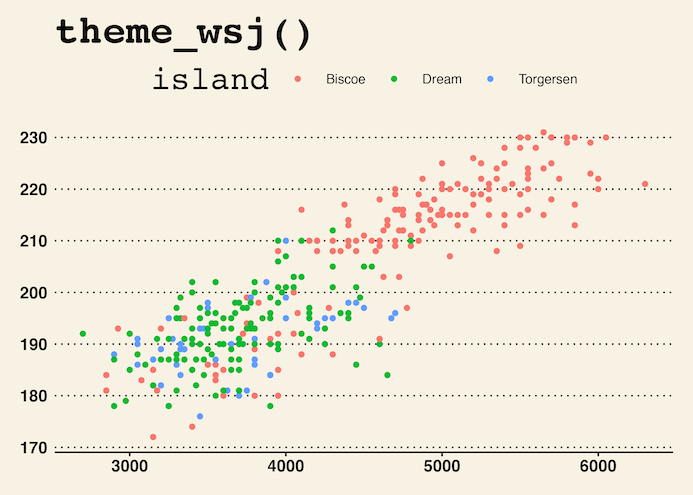In this post, we will learn how to make beautiful plots with ggplot2 using themes from ggthemes R package. By default ggplot2 makes plots with grey background, using theme_grey(). ggplot2 comes with about 8 complete themes that help us change the look of a given plot. If you want to customize your plot with more options, ggplot2 extension package ggthemes can help help you.
Here we will see three example themes from ggthemes package using palmer penguin dataset.
library(tidyverse)
library(palmerpenguins)
packageVersion("dplyr")
[1] '1.1.2'
packageVersion("ggplot2")
[1] '3.4.3'
penguins %>% head() # A tibble: 6 × 8 species island bill_length_mm bill_depth_mm flipper_length_mm body_mass_g <fct> <fct> <dbl> <dbl> <int> <int> 1 Adelie Torgersen 39.1 18.7 181 3750 2 Adelie Torgersen 39.5 17.4 186 3800 3 Adelie Torgersen 40.3 18 195 3250 4 Adelie Torgersen NA NA NA NA 5 Adelie Torgersen 36.7 19.3 193 3450 6 Adelie Torgersen 39.3 20.6 190 3650 # ℹ 2 more variables: sex <fct>, year <int>
Let us make a scatterplot between two numerical variables from penguin dataset.
penguins %>%
ggplot(aes(body_mass_g, flipper_length_mm, color=island))+
geom_point()
ggsave("default_ggplot2_theme.png")
By default, ggplot2 uses a theme with grey background.
ggthemes offer a number of themes that to change the appearance of a plot made with ggplot. We can add the ggthemes’ theme as additional layer to the plot.
In the example below we make the scatterplot using solarized theme using theme_solarized() by adding as a layer.
penguins %>%
ggplot(aes(body_mass_g, flipper_length_mm, color=island))+
geom_point()+
theme_solarized()+
ggtitle("theme_solarized()")
ggsave("ggplot2_theme_solarized_ggthemes.png")
In the second example, we change the default ggplot2 theme to a theme that resembles google docs using theme_gdocs().
penguins %>%
ggplot(aes(body_mass_g, flipper_length_mm, color=island))+
geom_point()+
theme_gdocs()+
ggtitle("theme_gdocs()")
ggsave("ggplot2_theme_googledoc_ggthemes.png")
In the third example, we using ggthemes’ theme_wsj() to make the scatter plot with the style that wall street journal uses in their articles.
penguins %>%
ggplot(aes(body_mass_g, flipper_length_mm, color=island))+
geom_point()+
theme_wsj()+
ggtitle("theme_wsj()")
ggsave("ggplot2_theme_wallstreet_journal_ggthemes.png")
